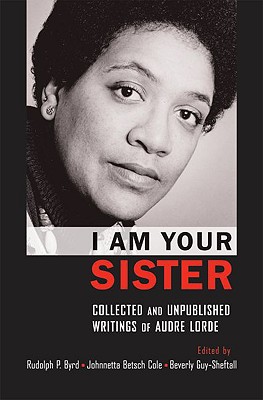[image is from here]
Audre Lorde, for over twenty-five years, has been a primary spiritual teacher in my life, a guide, role model, and exemplar of radical feminist being and practice. Her 66th birthday was on February 18th.
What follows next is from *here*.

Know Your
Audre Geraldine Lorde (February 18, 1934 – November 17, 1992) was a Caribbean-American writer, poet and activist.
Lorde’s poetry was published very regularly during the 1960s — in Langston Hughes’s 1962 New Negro Poets, USA; in several foreign anthologies; and in black literary magazines. During this time, she was politically active in civil rights, anti-war, and feminist movements. Her first volume of poetry, The First Cities (1968), was published by the Poet’s Press and edited by Diane di Prima, a former classmate and friend from Hunter College High School. Dudley Randall, a poet and critic, asserted in his review of the book that Lorde “does not wave a black flag, but her blackness is there, implicit, in the bone.”
Her second volume, Cables to Rage (1970), which was mainly written during her tenure at Tougaloo College in Mississippi, addresses themes of love, betrayal, childbirth and the complexities of raising children. It is particularly noteworthy for the poem “Martha”, in which Lorde poetically confirms her homosexuality: “[W]e shall love each other here if ever at all.”
Later books continued her political aims in lesbian and gay rights, and feminism. In 1980, together with Barbara Smith and Cherríe Moraga, she co-founded Kitchen Table: Women of Color Press, the first U.S. publisher for women of colour. Lorde was State Poet of New York from 1991 to 1992.
Lorde: Theory & Arguments
Lorde criticised feminists of the 1960s, from the National Organization for Women to Betty Friedan’s The Feminine Mystique, for focusing on the particular experiences and values of white middle-class women. Her writings are based on the “theory of difference”, the idea that the binary opposition between men and women is overly simplistic: although feminists have found it necessary to present the illusion of a solid, unified whole, the category of women itself is full of subdivisions.Lorde identified issues of class, race, age, gender and even health — this last was added as she battled cancer in her later years — as being fundamental to the female experience. She argued that, although the gender difference has received all the focus, these other differences are also essential and must be recognised and addressed. “Lorde”, it is written, “puts her emphasis on the authenticity of experience. She wants her difference acknowledged but not judged; she does not want to be subsumed into the one general category of ‘woman’”.[8] In a period during which the women’s movement was associated with white middle-class women, Lorde campaigned for a feminist movement conscious of both race and class.
While acknowledging that the differences between women are wide and varied, most of Lorde’s works are concerned with two subsets which concerned her primarily — race and sexuality. She observes that black women’s experiences are different from those of white women, and that, because the experience of the white woman is considered normative, the black woman’s experiences are marginalised; similarly, the experiences of the lesbian (and, in particular, the black lesbian) are considered aberrational, not in keeping with the true heart of the feminist movement. Although they are not considered normative, Lorde argues that these experiences are nevertheless valid and feminine.
Lorde stunned white feminists with her claim that racism, sexism and homophobia were linked, all coming from the failure to recognise or inability to tolerate difference. To allow these differences to continue to function as dividers, she believed, would be to replicate the oppression of women: as long as society continues to function in binaries, with a mandatory greater and lesser, Normative and Other, women will never be free.
Works
Lorde, Audre:The First Cities (1968).
Cables to Rage (1970).
From a Land Where Other People Live (1973).
New York Head Shop and Museum (1974).
Coal (1976).
Between Our Selves (1976).
The Black Unicorn (1978, W.W. Norton Publishing).
The Cancer Journals (1980 Aunt Lute Books).
Kore Press
Uses of the Erotic: The Erotic as Power (1981 Kore Books) Uses of the Erotic.
Chosen Poems: Old and New (1982).
Zami: A New Spelling of My Name (1983, The Crossing Press.)
Sister Outsider: Essays and Speeches (1984, 2007, The Crossing Press).
Our Dead Behind Us (1986).
A Burst of Light (1988, Firebrand Books).
The Marvelous Arithmetics of Distance (1993).
What follows is from *here*.
BGG Black History Month Spotlight: Audre Lorde
February 21st, 2010Black History Month Spotlight, Books, Celebrities, Culture

Audre Lorde, a self-described “black, lesbian, mother, warrior, poet,” remains a celebrated figure in our community for her contributions to gay culture through her published works and activism.
Lorde’s body of work includes The First Cities, Cables to Rage, From A Land Where Other People Live, Coal, The Black Unicorn, Zami: A Spelling of My Name, Sister Outsider, and A Burst of Light.
In the 80s, she co-founded Kitchen Table: Women of Color Press, the first publishing company run solely by women and was also a founding member of Sisters in Support of Sisters in South Africa (S.I.S.S.A.), which spoke out on concerns of women under apartheid.
She lived out the rest of her years with partner Gloria Joseph, while battling breast cancer, which eventually took her life in 1992 at the age of 58.

No comments:
Post a Comment